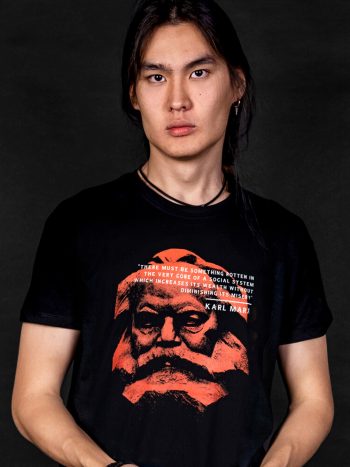-
£20Add to WishlistRemove from WishlistAdd to Wishlist
-
£20Add to WishlistRemove from WishlistAdd to Wishlist
-
£20Add to WishlistRemove from WishlistAdd to Wishlist
-
£20Add to WishlistRemove from WishlistAdd to Wishlist
-
£20Add to WishlistRemove from WishlistAdd to Wishlist
Within the writings of Karl Marx, one encounters a profound critique of the prevailing social, economic, and ideological structures of his time. Through his incisive analysis, Marx sought to unravel the complexities of class struggle, capitalism, and the role of religion and philosophy in shaping society.
The selected quotes from Marx’s works encapsulate his revolutionary perspective and offer profound insights into the mechanisms of oppression, the potential for collective action, and the vision of a just and egalitarian society.

From his scathing critique of religion as the “opium of the people” to his vision of economic equality with the principle of “from each according to his ability, to each according to his needs,” these quotes shed light on Marx’s enduring influence and his call to challenge prevailing systems and actively transform the world.
As we delve into these quotes, we embark on a journey into the essence of Marx’s ideas, unveiling his critique of capitalism, his analysis of societal power dynamics, and his call for the emancipation of the working class.
There must be something rotten in the very core of a social system which increases its wealth without diminishing its misery.
The quote encapsulates his profound critique of capitalism. Marx argues that the inherent contradiction of capitalism lies in its ability to generate wealth and prosperity for a few while failing to alleviate the widespread suffering and poverty experienced by the majority.
This quote highlights Marx’s observation that the accumulation of wealth in a capitalist society often occurs at the expense of the working class, who bear the brunt of exploitation and economic inequality.
Marx believed that the pursuit of profit and the inherent drive for capital accumulation within capitalism perpetuate a system that prioritises the interests of the bourgeoisie over the well-being of the working class.
By highlighting the persistence of misery alongside increasing wealth, Marx invites us to critically examine the fundamental flaws and contradictions within capitalist systems, ultimately challenging us to envision alternative models that prioritise social justice and human flourishing.
The history of all hitherto existing society is the history of class struggles.
This quote highlights Marx’s central thesis that throughout history, societies have been characterised by conflicts between different classes. It suggests that social change is driven by these struggles, as classes with conflicting interests vie for power and resources.
Marx believed that the history of society is essentially the history of the ruling class’s domination and the resistance and struggles of the oppressed class.
Capital is dead labor, which, vampire-like, lives only by sucking living labor, and lives the more, the more labor it sucks.
This quote encapsulates Marx’s critique of capitalism and its exploitative nature. He argues that capital, in the form of accumulated wealth and means of production, derives its value and sustenance by exploiting the labour of the working class. Marx believed that capitalism perpetuates a system of wealth accumulation through the extraction of surplus value from the labour of the proletariat.

The ruling ideas of each age have ever been the ideas of its ruling class.
Here, Marx emphasizes that the dominant ideology and worldview within a society are shaped by the ruling class. The ruling class, which possesses economic and political power, has the means to influence and control the dissemination of ideas, ensuring that those ideas serve their interests.
This quote highlights the connection between economic power and the ability to shape society’s beliefs and values.
Workers of the world, unite! You have nothing to lose but your chains.
This famous rallying cry reflects Marx’s belief in the international unity of the working class. He envisioned a global proletariat movement that transcends national boundaries and unites against the oppressive forces of capitalism.
Marx believed that the working class, once conscious of their own power and common interests, could establish a new social order based on equality and solidarity.
By advocating for worker solidarity, Marx aimed to foster a collective consciousness that could challenge the prevailing capitalist order.

The bourgeoisie... has resolved personal worth into exchange value, and in place of the numberless indefeasible chartered freedoms, has set up that single, unconscionable freedom—Free Trade.
This quote critiques the capitalist bourgeoisie, who, according to Marx, reduce human worth to mere economic value.
Marx argues that capitalism, with its emphasis on profit and market forces, commodifies human labour and turns individuals into mere instruments of production.
He also critiques the notion of “Free Trade,” suggesting that it masks and perpetuates the exploitative nature of capitalism.
The theory of the Communists may be summed up in the single sentence: abolition of private property.
This quote encapsulates Marx’s central tenet of communism—the abolition of private property. Marx argued that private ownership of the means of production leads to exploitation and inequality.
By advocating for the collective ownership of resources and the means of production, Marx envisioned a society where wealth and resources are shared equitably among all members, eliminating class distinctions.
Men make their own history, but they do not make it as they please; they do not make it under self-selected circumstances, but under circumstances existing already, given and transmitted from the past.
This quote emphasizes the interplay between human agency and social structures. Marx acknowledges that individuals have the capacity to shape history, but their agency is constrained by the existing social, economic, and political conditions inherited from the past.
Marx’s historical materialism underscores the importance of understanding the structural forces that shape human actions and the potential for collective change within those parameters.
Religion is the opium of the people.
This quote is a critique of organised religion by Marx. He argues that religion serves as a form of social control and pacifies the working class by providing them with a sense of solace and hope in the face of their material struggles.
Marx believed that religion, by emphasizing otherworldly rewards and acceptance of the status quo, distracts the proletariat from their present conditions and hinders their potential for revolutionary action.
From each according to his ability, to each according to his needs.
This famous quote encapsulates Marx’s vision of a communist society, where resources are allocated based on individuals’ needs and contributions. It highlights the principle of economic equality and the rejection of individual accumulation of wealth.
Marx argued that in a truly egalitarian society, individuals should contribute according to their abilities while receiving what they require for a dignified existence.
The philosophers have only interpreted the world in various ways; the point is to change it.
This quote emphasizes Marx’s belief in the practical application of theory. He criticises philosophers and intellectuals for focusing solely on interpreting the world without taking action to transform it.
Marx aimed to bridge the gap between theory and practice by encouraging the working class to engage in revolutionary praxis and actively shape their own destinies through social and political change.
The bourgeoisie has torn away from the family its sentimental veil, and has reduced the family relation to a mere money relation.
In this quote, Marx examines the impact of capitalism on familial relationships. He suggests that the bourgeoisie, driven by the pursuit of profit and individualistic interests, has transformed family ties into economic transactions.
Marx believed that capitalism’s emphasis on monetary exchange and commodification erodes the traditional social bonds within the family and reduces human relationships to mere economic transactions.
In his writings, Karl Marx emphasizes the need for the working class to go beyond incremental struggles and instead focus on seizing the means of production.
Marx argues that the everyday fights of the working class against the effects of capitalism, such as exploitation and poor working conditions, are necessary but insufficient.
Instead, he urges the working class to recognise that the existing system itself perpetuates their misery and that fundamental change requires a revolutionary transformation of the economic system.
Marx advocates for the abolition of the wages system, emphasizing the need for the working class to take control of the means of production and reshape society in a way that prioritises the collective well-being rather than individual profit.
Marx calls for a radical reimagining of the socioeconomic order, where the working class becomes the driving force behind the transformation of society.

































